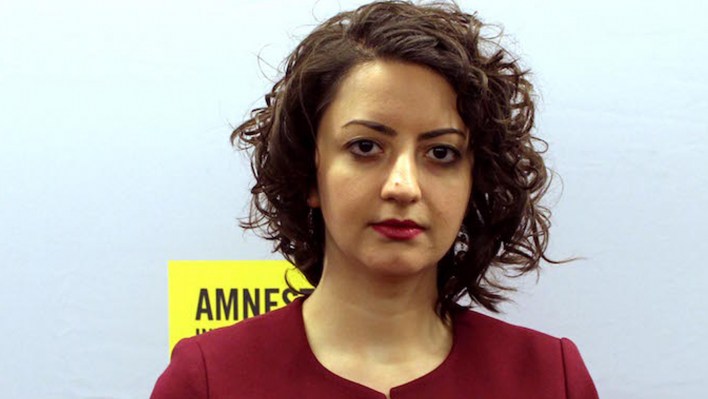Raha Bahreini’s passion for human rights was born in Iran, nurtured in U of T’s Women and Gender Studies Institute and is now helping improve the lives of Iranians still facing oppression, repression and discrimination.
As Amnesty International’s researcher on Iran, Bahreini leads large-scale projects that inform the campaigns and advocacy work of Amnesty International and its activist networks. She researches, evaluates and documents human rights violations, with key concerns being: wrongful imprisonment, torture and the death penalty, restricted freedoms, systematic discrimination against women and minorities, and the Iranian authorities’ lack of accountability.
“I always had a passion for social justice and human rights issues, and it’s a passion that continues to inform my work today,” says Bahreini, who immigrated to Canada with her family from Iran when she was 16. “From a very early age I knew I wanted to become a human rights lawyer and join the struggle toward building a more just and compassionate society.”
Her post-secondary journey to realizing that dream started in U of T’s Faculty of Arts & Science as a member of Victoria College. While earning her honours bachelor of arts in women and gender studies, and ethics, society and law, she was awarded the City of Toronto Women and Gender Studies Scholarship in 2008 that boosted her morale and helped her excel academically.
“The scholarship allowed me to focus on my studies and achieve the marks I needed for law school,” she says. “In terms of my morale, it was great to receive a scholarship of this stature, especially in the area of women’s issues, because that was always one of my priorities in terms of both research and activism.”
While earning her law degree at Osgoode Hall Law School at York University, she worked as a legal caseworker with Parkdale Community Legal Services in Toronto, assisting vulnerable asylum seekers and migrants. Upon graduation, she launched a career in social justice and human rights issues in Canada, first as a public interest law fellow with Amnesty International Canada and then as a senior researcher with a human rights unit at the University of Essex, U.K, where she assisted the work of the UN Special Rapporteur on the situation of human rights in Iran. She also continued her postgraduation studies, earning a masters in international human rights law from the University of Essex, U.K.
Now with Amnesty International, Bahreini works with a trusted network of activists and lawyers inside Iran and in diaspora to develop detailed reports of human rights violations.
True to her U of T studies, her work acknowledges the impact human rights violations have on women and persons with diverse sexual orientations and gender identities. Her projects have addressed issues of discrimination and violence based on sexual orientation and gender identity; violations of sexual and reproductive rights; and homophobia and transphobia around gender reassignment surgery processes in Iran.
“I always seek to apply a gender lens to any projects we do, even if on the surface it doesn’t seem to relate specifically to women or persons of diverse sexual orientations and gender identities. It’s always important to assess the disproportionate impact that abusive policies and practices may have on women and other communities facing long-standing patterns of discrimination and inequality,” she says, adding that recent projects have included campaigning and advocacy against discriminatory and degrading laws forcing women in Iran to wear the veil and researching the cases of women’s rights defenders who have been unjustly imprisoned for peacefully protesting against forced veiling.
While she believes everyone has the power to show empathy and compassion for victims of human rights violations, her own childhood played a role in heightening her desire to help people live freer lives.
“I grew up in the 1980s, one of the most heinous chapters of state violence in Iran’s modern history. Thousands of political dissidents were summarily executed and thousands more were arbitrarily imprisoned and systematically tortured. I vividly remember the rage I felt so often because public officials were denying us freedom of belief and cruelly forcing us to follow codes of conduct rooted in the most strict interpretation of Shi’a Islam,” she says. “When you are exposed to extreme forms of oppression, repression and discrimination, the urge to make changes can become more intense.
“In my case seeing the oppression and suffering inflicted on my family, friends, neighbours and fellow human beings, and also as a girl growing up in a country with discriminatory and degrading laws and practices against girls and women, I always wanted to resist oppressive systems. The experience of immigration to Canada broadened my perspective beyond Iran. Systems of oppression operate at varying levels in every society and context. But fortunately, so do the collective struggles of people for justice and equality.”
This profile is part of our celebration of the 35th anniversary of the City of Toronto Women and Gender Studies Scholarship. Read about other recipients here.

